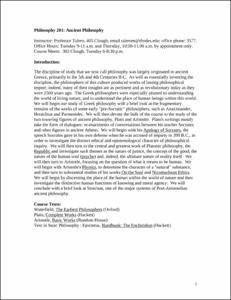Please use this identifier to cite or link to this item:
http://hdl.handle.net/10267/3498Full metadata record
| DC Field | Value | Language |
|---|---|---|
| dc.contributor.author | Talero, Maria L. | - |
| dc.date.accessioned | 2009-02-26T17:29:57Z | - |
| dc.date.available | 2009-02-26T17:29:57Z | - |
| dc.date.issued | 2005-08-30 | - |
| dc.identifier.uri | http://hdl.handle.net/10267/3498 | - |
| dc.description | This syllabus was submitted to the Rhodes College Office of Academic Affairs by the course instructor. | en_US |
| dc.description.abstract | The discipline of study that we now call philosophy was largely originated in ancient Greece, primarily in the 5th and 4th Centuries B.C. As well as essentially inventing the discipline, the philosophers of this culture produced works of lasting philosophical import; indeed, many of their insights are as pertinent and as revolutionary today as they were 2500 years ago. The Greek philosophers were especially attuned to understanding the world of living nature, and to understand the place of human beings within this world. We will begin our study of Greek philosophy with a brief look at the fragmentary remains of the works of some early "pre-Socratic" philosophers, such as Anaximander, Heraclitus and Parmenides. We will then devote the bulk of the course to the study of the two towering figures of ancient philosophy, Plato and Aristotle. Plato's writings mostly take the form of dialogues: re-enactments of conversations between his teacher Socrates and other figures in ancient Athens. We will begin with his Apology of Socrates, the speech Socrates gave in his own defense when he was accused of impiety in 399 B.C., in order to investigate the distinct ethical and epistemological character of philosophical inquiry. We will then turn to the central and greatest work of Platonic philosophy, the Republic and investigate such themes as the nature of justice, the concept of the good, the nature of the human soul (psyche) and, indeed, the ultimate nature of reality itself. We will then turn to Aristotle, focusing on the question of what it means to be human. We will begin with Aristotle's Physics, to determine the character of a "natural" substance, and then turn to substantial studies of his works On the Soul and Nicomachean Ethics. We will begin by discerning the place of the human within the world of nature and then investigate the distinctive human functions of knowing and moral agency. We will conclude with a brief look at Stoicism, one of the major systems of Post-Aristotelian ancient philosophy. | en_US |
| dc.language | English(United States) | - |
| dc.language.iso | en_US | en_US |
| dc.publisher | Memphis, Tenn. : Rhodes College | en_US |
| dc.relation.ispartofseries | Syllabi CRN | en_US |
| dc.rights | Rhodes College owns the rights to the archival digital images in this repository. Images are made available for educational use only and may not be used for any non-educational or commercial purpose. Approved educational uses include private research and scholarship, teaching, and student projects. For additional information please contact archives@rhodes.edu. Fees may apply. | - |
| dc.subject | Philosophy, Department of | en_US |
| dc.subject | Syllabus | en_US |
| dc.subject | Curriculum | en_US |
| dc.subject | Academic departments | en_US |
| dc.subject | Text | en_US |
| dc.subject | 2005 Fall | en_US |
| dc.title | PHIL 201-01, Ancient Philosophy, Fall 2005 | en_US |
| dc.type | Syllabus | en_US |
| Appears in Collections: | Course Syllabi | |
Files in This Item:
| File | Description | Size | Format | |
|---|---|---|---|---|
| 2005_fall_PHIL_201-01.pdf | 33.68 kB | Adobe PDF |  View/Open |
Items in DSpace are protected by copyright, with all rights reserved, unless otherwise indicated.